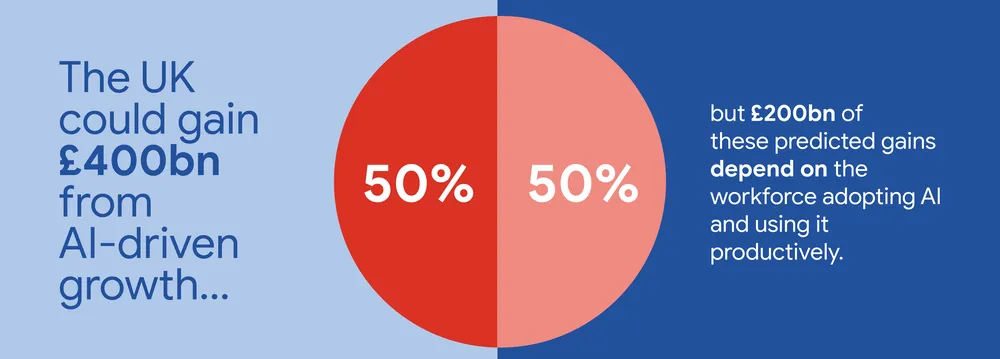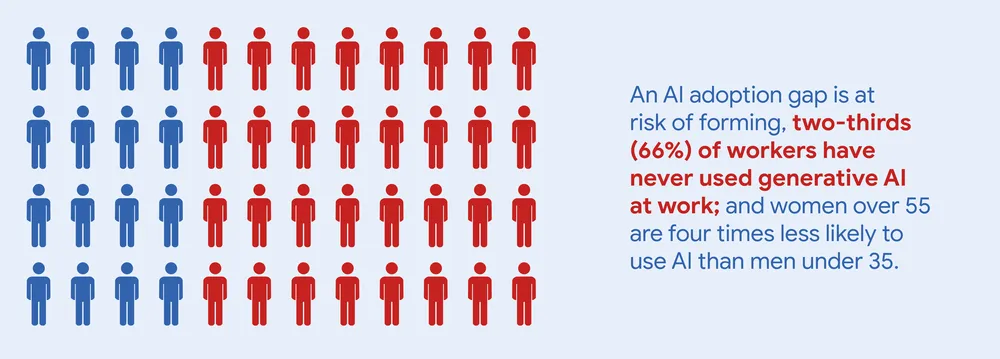Mind the Gap: Google Warns UK Risks Billions Without Wider AI Adoption

▼ Summary
– Artificial intelligence could boost the UK’s economy by £400 billion by 2030, but this depends on increasing AI adoption among the workforce.
– Two-thirds of UK workers have never used generative AI, with notable gaps among women over 55 and lower socio-economic groups.
– Google emphasizes the need for better training, clear company guidance, and cultural shifts to encourage AI tool usage.
– Google’s “AI Works” initiative showed that targeted training can significantly increase AI adoption, saving workers over 122 hours annually.
– Google recommends integrating AI support into industrial strategy, ensuring public sector access, and establishing a lifelong learning accreditation system.
The United Kingdom stands at a crossroads. Artificial intelligence offers a potential £400 billion boost to the nation’s economy by 2030, primarily through productivity gains, according to research highlighted by Google. However, the tech giant cautions that realising the full scale of this benefit hinges critically on bridging a significant gap in AI adoption across the workforce.
New findings indicate a reluctance or inability among many UK workers to embrace generative AI tools. Google’s research, involving partners like Public First, reveals that two-thirds (66%) of workers have never used generative AI in their jobs. This gap is particularly noticeable among women over 55 and individuals from lower socio-economic backgrounds.
The Adoption Challenge
Debbie Weinstein, President of Google in Europe, the Middle East, and Africa (EMEA), described the findings as a “call to arms,” emphasizing the need to equip workers with the necessary tools. The research suggests that the UK has historically been slower than some other nations in adopting new technologies, a pattern that could hinder its ability to capitalize on AI’s potential.

The slow uptake isn’t just about access; it stems from a lack of training, unclear company guidance, and cultural factors. Many workers, according to Weinstein and the associated “AI Works” report, feel they need explicit “permission to prompt” – reassurance that using AI tools is acceptable and encouraged.
Bridging the Divide
Google’s “AI Works” initiative, launched last summer in partnership with unions, small businesses, and educators, piloted methods to accelerate AI adoption and upskilling among 1,700 people. The results are encouraging:
- Habits Form Quickly: Just a few hours of targeted training significantly increased daily AI usage, doubling it in some cases, with effects lasting months later. This proved effective across demographics, notably narrowing the adoption gap for women over 50.
- Time Savings are Real: Pilot participants estimated generative AI saved them, on average, over 122 hours annually, exceeding initial projections.
- Permission Matters: Clear policies and explicit permission from employers significantly boosted workers’ willingness to use AI tools.
A Path Forward
Based on these findings, Google advocates for several key actions:
- Industry Support: Integrating AI adoption support into the UK’s industrial strategy, targeting key sectors.
- Public Sector Leadership: Guaranteeing AI training and tool access for all public sector workers.
- Lifelong Learning: Establishing a Skills England-backed accreditation system for concise, effective AI training courses to foster a culture of continuous learning.

Technology Secretary Peter Kyle acknowledged the need to support workers, stating, “We will support workers to develop the skills they need for jobs in and with AI, so that all parts of society can benefit from this technology.”
The message is clear: while the UK possesses strong AI research capabilities, turning that potential into widespread economic benefit requires a concerted effort to upskill the workforce and encourage the adoption of AI tools across all sectors and demographics. Failure to do so could mean leaving £200 billion of potential economic growth on the table.
(Source: Google)





